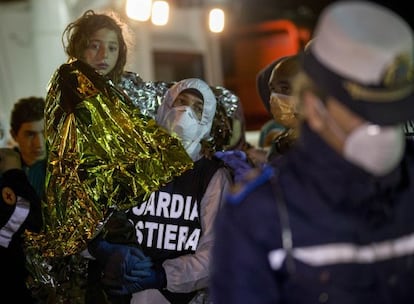Spain pushes for UN action against illegal immigration from Libya
Options include sinking empty boats so the mafias cannot use them to transport migrants


The best way to stop migrants from drowning on their way to Europe might be to prevent them from boarding ships in Libya, the Spanish government believes.
The “horrendous spectacle,” as described by Foreign Minister José Manuel García-Margallo, of the recent sinking of a vessel with around 850 people on board has shaken European governments into action.
Now Spain, for whom illegal immigration from North Africa is a matter of concern, has secured support from Italy and is pushing forward a resolution at the United Nations Security Council, where it holds a rotating seat.
We cannot wait indefinitely for a government of national unity to be formed in Libya”
The proposal seeks to contain the human avalanche through a limited international intervention.
“We cannot wait indefinitely for a government of national unity to be formed in Libya,” said Spanish diplomatic sources. The UN Secretary General’s envoy, Bernardino León, “must issue an ultimatum to all parties,” the same sources argue.
This means setting a deadline for the creation of an all-inclusive government in Libya; failing that, and if no government at all emerges from the process, the UN mandate would be sufficient.
But in diplomatic circles, there is talk about more executive action to stop the waves of illegal migrants currently boarding vessels along the Libyan coast.
One option under consideration is authorizing the sinking of empty migrant boats, mirroring Atalanta, a European operation against Somalian piracy.
The European agency Frontex has reported that the migrant boats keep getting larger and that people travel in increasingly crowded conditions. Military sources note that these vessels are nearly always junk ships that are barely seaworthy, and get scrapped if they are seized.
“So is this about sinking them at port? And in that case, how do you make sure that they belong to the mafias?” said the same sources, recalling that the bombing of boats on land was only carried out once, for purposes of deterrence, in Somalia.

The alternative would be to deploy a European military or police force in “the four or five points in Libya” where most migrant boats depart from. But this option would only work if a deal is reached with the militias controlling the ports in question. Even then, the trafficking rings could change their departure points and use smaller vessels.
“It won’t do to patch up the problem without addressing the issue of instability in Libya,” says one diplomat.
One admiral said that drownings have increased because Frontex has pulled away from the Libyan coasts.
“We could get closer and rescue them a few miles out from their departure point. But would we be allowed to take them back to Libya?” he wonders. “And who would take charge of them? There are no easy or miracle solutions.”
Tu suscripción se está usando en otro dispositivo
¿Quieres añadir otro usuario a tu suscripción?
Si continúas leyendo en este dispositivo, no se podrá leer en el otro.
FlechaTu suscripción se está usando en otro dispositivo y solo puedes acceder a EL PAÍS desde un dispositivo a la vez.
Si quieres compartir tu cuenta, cambia tu suscripción a la modalidad Premium, así podrás añadir otro usuario. Cada uno accederá con su propia cuenta de email, lo que os permitirá personalizar vuestra experiencia en EL PAÍS.
En el caso de no saber quién está usando tu cuenta, te recomendamos cambiar tu contraseña aquí.
Si decides continuar compartiendo tu cuenta, este mensaje se mostrará en tu dispositivo y en el de la otra persona que está usando tu cuenta de forma indefinida, afectando a tu experiencia de lectura. Puedes consultar aquí los términos y condiciones de la suscripción digital.








































